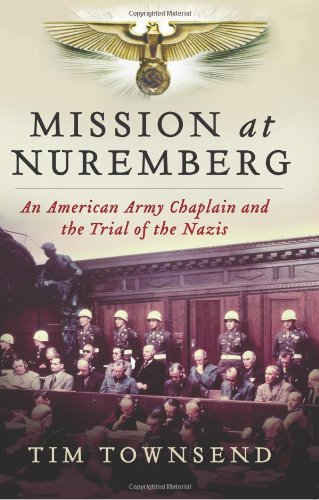 Mission at Nuremberg: An American Army Chaplain and the Trial of the Nazis by Tim Townsend.
Mission at Nuremberg: An American Army Chaplain and the Trial of the Nazis by Tim Townsend.
Townsend, Formerly the religion reporter at the St. Louis Post-Dispatch, is a veteran on the “God beat”, having written for several U.S. newspapers and other publications. In this book, he has given readers interested in World War II and its aftermath an insightful look at a quiet and unassuming hero, Lutheran pastor and chaplain Henry Gerecke. Pastor Gerecke was fifty years old when he enlisted in the Army Chaplain Corps in 1943. He was at the upper limit of the acceptable age range for the chaplaincy, but the army was in desperate need of more chaplains to meet the spiritual needs of the men in the U.S. Army who were fighting both in Europe and in the Pacific.
This book was especially poignant for me for a couple of reasons: one, my father-in-law, John Early, was an army chaplain during World War II. Although he served stateside for his entire war, he could easily have been sent to Europe and then to Germany to minister in some of the same circumstances that Gerecke served in. In fact, Gerecke’s personality, background, and ministry reminded me of my father-in-law quite a bit. Both men came from rural homes and ministered in small, lowly places before the war. Both men were humble evangelical preachers who longed to see men (and women) come to a saving knowledge of Jesus Christ. Both attended chaplain school at Harvard University, and both worked hard with the help of a much appreciated chaplain’s assistant to counsel, preach, lecture, file paperwork, write letters of condolence, and do many more services to the soldiers under their care. My father-in-law spoke often and fondly of his assistant, Donald.
The second reason that the book spoke to me had to do with Chaplain Gerecke’s particular assignment, after the surrender of Germany, to attend the trial at Nuremberg and minister to the high-ranking Nazis who were on trial there. According to the Geneva Conventions and U.S. army regulations, the United States was responsible to provide spiritual comfort to the Nazi prisoners. Having a German chaplain did not seem advisable since the prisoners were being held in strict confinement and their captors were concerned that they might be the object of attempts to help them escape or commit suicide. Because he could speak German and because he was recommended by colleagues as a dedicated Lutheran minister, Gerecke was asked to extend his service in the army and come to Nuremberg to minister to such notorious criminals as Joachim von Ribbentrop, Hitler’s foreign minister, Albert Speer, Hitler’s architect, and Hermann Goering, head of the German Air Force and Hitler’s designated successor. Gerecke found himself preaching and eventually administering communion to some of the world’s worst criminals, men who were responsible for the torture, rape, and death of millions. What an amazing story of courage, spiritual discernment, and grace!
There are aspects of this story that Townsend discusses thoroughly and then leaves as open questions. Should Gerecke have given communion, a sacrament in Lutheran theology, to men who may have only been “jailhouse converts”? On the other hand, should he have honored the request of one of the Nazis to commune, even though the man made it clear that he did not believe in or put his trust in Christ, but simply wanted to receive communion as a sort of insurance? (Gerecke refused communion to the man under those circumstances.) Can or should a Christian minister promise forgiveness to men who sinned against so many, a great number of whom were Jews whose understanding of forgiveness might be much different from a Christian understanding and who might very well resent the offering of forgiveness on their behalf without their consent? What was Gerecke’s role as a minister of the gospel in the face of such evil men? Does the gospel, the good news of God’s grace and forgiveness, extend to such perpetrators of such horrible crimes? I appreciated Townsend’s discussion of such thorny and difficult moral and theological dilemmas and his leaving it to the reader to decide for himself what the answers to those questions might be.
“Those chaplains believed that God loves all human beings, including perpetrators, and so their decision was more about how to minister to the Nazis, not whether they should. The process of ministering to those who have committed evil involves returning the wrongdoer to goodness, a difficult challenge when faced with a leader of the Third Reich. For Gerecke and O’Connor (the Catholic chaplain at Nuremberg) that challenge meant using what they had learned about each defendant to spiritually lead him back from the place where he’d fallen to a place of restoration.
. . . A middle-aged American preacher . . . was attempting to bring what he believed was God’s light into a dark heart. The Nuremberg chaplains were not judging the members of their flocks, nor were they forgiving their crimes against humanity. They were trying to lead those Nazis who were willing to follow toward a deeper insight into what they had done. They were attempting to give Hitler’s henchmen new standing as human beings before their impending executions.”
Excellent thoughtful, challenging nonfiction about a humble but steadfast pastor who served God in the darkest of prisons.
Sounds fascinating and challenging!
I have this on my TBR list after seeing it mentioned here and there. Sounds fascinating.
Pingback: Baker’s Dozen: Best Nonfiction I Read in 2015 | Semicolon